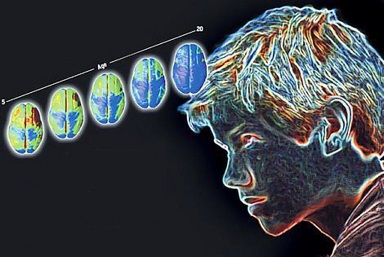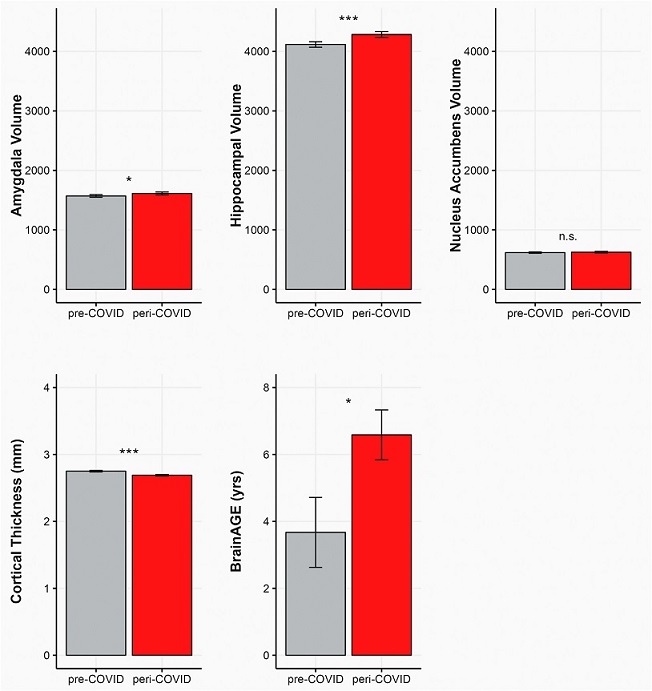COVID-19 News: Stanford Study Alarmingly Shows That The Ongoing COVID-19 Pandemic Is Causing The Brains Of Adolescents To Age Rapidly!
COVID-19 News - Brain Aging In Adolescents Dec 05, 2022 3 years, 1 week, 4 days, 22 hours, 40 minutes ago
COVID-19 News: New worrying study findings show that the ongoing COVID-19 pandemic is causing the brains of adolescents to age rapidly!

The study was conducted by researchers from the Department of Psychology, Stanford University-USA.
The ongoing COVID-19 pandemic has caused significant stress and disruption for young individuals, likely leading to alterations in their mental health and neurodevelopment.
However, to date, it is not clear whether youth who lived through the pandemic and its shutdowns are comparable psychobiologically to their age- and sex-matched peers assessed before the pandemic. This question is particularly important for researchers who are analyzing longitudinal data that span the pandemic.
The study team compared carefully matched youth assessed before the pandemic (n=81) and after the pandemic-related shutdowns ended (n=82).
The study findings showed that youth assessed after the pandemic shutdowns had more severe internalizing mental health problems, reduced cortical thickness, larger hippocampal and amygdala volume, and more advanced brain age.
The study findings indicate that not only does the COVID-19 pandemic appear to have led to poorer mental health and accelerated brain aging in adolescents, but it also poses significant challenges to researchers analyzing data from longitudinal studies of normative development that were interrupted by the pandemic.
The study findings were published in the peer reviewed Journal: Global Open Science.
https://www.bpsgos.org/article/S2667-1743(22)00142-2/fulltext
This is the first study to assess how stress and social disruptions caused by the ongoing COVID-19 pandemic have affected the neurological development of young adults.
Past studies have shown that adversity early in life, such as exposure to a sexuak crimes, violent environment, family dysfunction, and neglect, can accelerate brain maturation or aging in children and adolescents.
Importantly, many of these studies have reported reduced cortical thickness, which is indicative of aging, in the brains of children who experienced early adversities.
It has been found that throughout the COVID-19 pandemic, increased social isolation and the transition to almost entirely remote learning settings has led many young adults and children to experience significant adversities.
Worryingly, these new challenges are coupled with increased financial stress, exposure to familial violence, and the potential adverse effects of infection with the SARS-CoV-2 coronavirus, the causative pathogen responsible for COVID-19.
Corresponding author, Dr Ian H. Gotlib, a professor at Department of Psychology, Stanford University, told
COVID-19 News outlets, “We already know from global research that the pandemic has adversely affected mental health in youth, but we didn’t know what, if anything, it was doing physically to their brains.”
In all, a total o
f 163 adolescents were included in the current study, 103 of whom were female. Every study participant self-reported their depressive symptoms using the ten-item version of the Children’s Depression Inventory. Anxiety symptoms of the participants were also assessed using the Social Anxiety and Physical Symptom subscales of the Multidimensional Anxiety Scale for Children (MASC).
Besides self-reported mental health symptoms, a subset of the study cohort also provided magnetic resonance imaging (MRI) scans of their brains to obtain cortical thickness and subcortical measurements.
The cortical thickness and subcortical measurements were used to calculate brain age gap estimate (BrainAGE) values for all study participants through the use of a sex-specific machine-learning-based model developed by the ENIGMA-Brain Age working group.
 Raw data are plotted for visualization. Significance levels are based on group differences on subcortical volumes (in mm) adjusted for intracranial volume, cortical thickness, and on BrainAGE adjusted for chronological age. *p<.05, **p<.01., ***p<.001.
Raw data are plotted for visualization. Significance levels are based on group differences on subcortical volumes (in mm) adjusted for intracranial volume, cortical thickness, and on BrainAGE adjusted for chronological age. *p<.05, **p<.01., ***p<.001.
It was noted that study participants in the “peri-COVID” group, which included adolescents who experienced COVID-19 shutdowns, were matched by age, sex, puberty, exposure to early life stress, and socioeconomic status to a “pre-COVID” group.
Interestingly, when comparing the frequency and intensity of self-reported mental health symptoms, the study team found that the peri-COVID group was more likely to report severe symptoms of anxiety, depression, and internalizing problems as compared to the pre-COVID group.
There was however no difference between the two groups in their frequency of externalizing problems.
Detailed analysis of the MRI scans demonstrated that peri-COVID group participants had reduced bilateral cortical thickness, as well as greater bilateral hippocampal and amygdala volumes.
Importantly, the peri-COVID group was found to have a greater BrainAGE as compared to those in the pre-COVID group.
Professor Gotlib commented, “These neuroanatomical differences indicate that the brains of adolescents who experienced COVID-19 lockdowns aged at a much more rapid rate as compared to their peers who were assessed before the COVID-19 pandemic. Similarly, larger positive BrainAGE measurements indicated that the brains of the peri-COVID group also appeared older.”
It was noted that it is unclear whether the changes in brain structure that the study team observed are linked to changes in mental health. It’s also not clear if the changes are permanent.
However, the research findings are significant, as they indicate that the COVID-19 pandemic and the strict public health measures that were implemented in order to protect public health caused significant damage to both the mental health and neuroanatomical development of adolescents. These unique changes may also prevent the brains of current adolescents to be comparable to those previously obtained from their peers just a few years ago.
The study team that future studies are warranted to determine whether these changes are temporary or may have long-term effects on the developing brain. In the event that these alterations are enduring, future studies will need to account for the abnormal rate of brain growth observed in this generation.
For the latest
COVID-19 News, keep on logging to Thailand Medical News.

